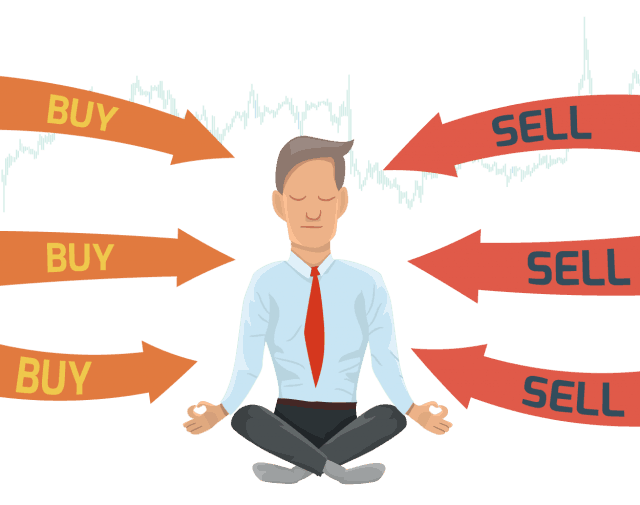There are 3 core aspects that make up forex trading:
- Trading Strategy
- Risk Management
- Trading Psychology
This is not in a particular order – in fact, the order of importance will vary on the type of trader that you are.
However, most new traders completely ignore trader psychology and, quite frankly, it is one of the biggest mistakes you can make.
The influence your mindset has on your performance is huge and it will impact your trading every single day.
In this recent live training session I covered a lot of ground on this topic. I strongly suggest you watch it to get the most out of the material.
This accompanying article takes a look at some of the larger points of the session for those of you that don’t have the time to watch it all.
Let’s jump right in!
Trader Psychology – Three Fears of Trading
There are three main fears that can take hold of your trading. Each one has the potential to negatively impact your trading over the short AND long term.
The first step to preventing these fears is being aware of them. You’ll be surprised at how important this first step is and just how helpful it can be.
The three fears are:
Fear of Missing Out
Fear of Losing
Fear of Trading
By taking a look at each of these in-depth, you will see how your mindset and trading psychology has a big impact on all stages of a trade.
The best traders in the world are always aware of the potential pitfalls each fear presents.
Fear of Missing Out
Otherwise known as FOMO, the fear of missing out is not wanting to miss a trade opportunity. It is extremely common in new traders but even experienced traders come up against this fear.
Take myself as an example. In the live session, I discuss a trade I took on EURUSD that I entered due to FOMO.
I saw the trade triggering during my analysis and didn’t want to miss out.
So I quickly put in trade parameters and entered. It was mere pips away from hitting my stop loss and resulting in a lost trade.
I got lucky. My quick decisions based off of my desire to not miss the trade at any cost almost lost me money. It should have and in most cases it will do.
So how do we combat this?
I call it “Disconnect“.
Whenever something happens quickly in the market you will get that urge to enter. It is almost always a bad thing.
So, if I recognize this happening I do something very simple. I move my hands away from whatever I am trading on.
If it’s my computer, I take my hands off the mouse and keyboard. If I am on my phone, I put it down.
This forces you to take a moment and literally just think about and look at the trade.
Ask yourself, “Should I really get in this trade?”.
Now, the next step you can take to further help is to open your trade checklist.
This is a very simple tool but it is one of the best ways to avoid FOMO. It forces you to ask critical questions of the trade which will help you gain back that objective analysis.
Trader Psychology – Fear of Losing
Another big influence on your trades is the fear of losing.
I would argue that this is the most common fear and the biggest reason for why so many traders are not profitable.
So you need to understand this problem and know how to prevent it.
The fear of losing stems from the worry you have over whether your trade will win or lose.
Often you will see a snowballing effect with this. One moment you are worried price may not push in your direction. 10 minutes later you check your charts and price has pulled back to your entry even further.
This causes you to once again worry about whether you should be in this trade or exit before it becomes a loss.
Repeat this process a few times and eventually you are going to exit a trade without letting it run. All because you are paranoid that the trade won’t be a winner. This can have a massive impact on your psychology of trading.
So how do we push back against this fear? Ultimately, you are going to lose trades. Every trader will, and that is fine.
We learn from our mistakes so it is important to not psyche yourself out.
A really effective way to combat all of this is to set time limits for when you can check your charts. It is as easy as that.
What this does is disconnect you from your charts and also prevents that snowballing effect.
It depends on the time frame you are trading, but on the daily, let’s say your time limit is a 5 minute check of your trade every 4 hours.
This is a firm rule that we need to follow.
The most important part of this detachment is that it prevents the negative voice inside your head from taking over and dictating your decisions.
These are called cognitive distortions and letting them dictate your trading decisions is what we need to avoid.
Fear of Trading
Last but not least we have the fear of trading, also known as fear of independence.
This concerns your confidence in your own trading capabilities. You will often see this become an issue after losing streaks or months where you haven’t made a profit.
The confidence you have in your ability to take good trades takes a hit and before you know it, you can’t seem to pull the trigger on entering trades.
You are questioning your analysis, trade parameters, strategy – all of these become a source of worry and can result in a trader not making decisions.
The worst case scenario of this is that you find and rely on signal services. You lose your independence as a trader and the growth of your trading skill set is stunted.
Copying traders, copying the pack, is not going to find you success.
So disconnecting from trading social media, social media in general, is how to prevent this. Comparing yourself to others in the forex market is not going to get you far.
Everyone trades differently – my own course and students are proof of that. In the forum you will see that hundreds of traders using the same strategy will not yield the same results for any two people.
We all carry out different analysis. We all have different strengths and weaknesses. We have different preferences in regards to time frames, risk, and so much more.
I always encourage traders to work on themselves and not evaluate their performance through comparison to other traders.
This is why you have a trading plan. It enables you to stick to your own plan and allows you to make improvements where YOU need them.
Q&A
That covers the main points that we went over in this webinar.
There are still so many details and topics I discuss in the live session that I can’t cover all of them in this article. I definitely recommend trying to watch it when you can.
Feel free to leave any questions on this article and I’ll be sure to answer all of them!





Comments are closed.